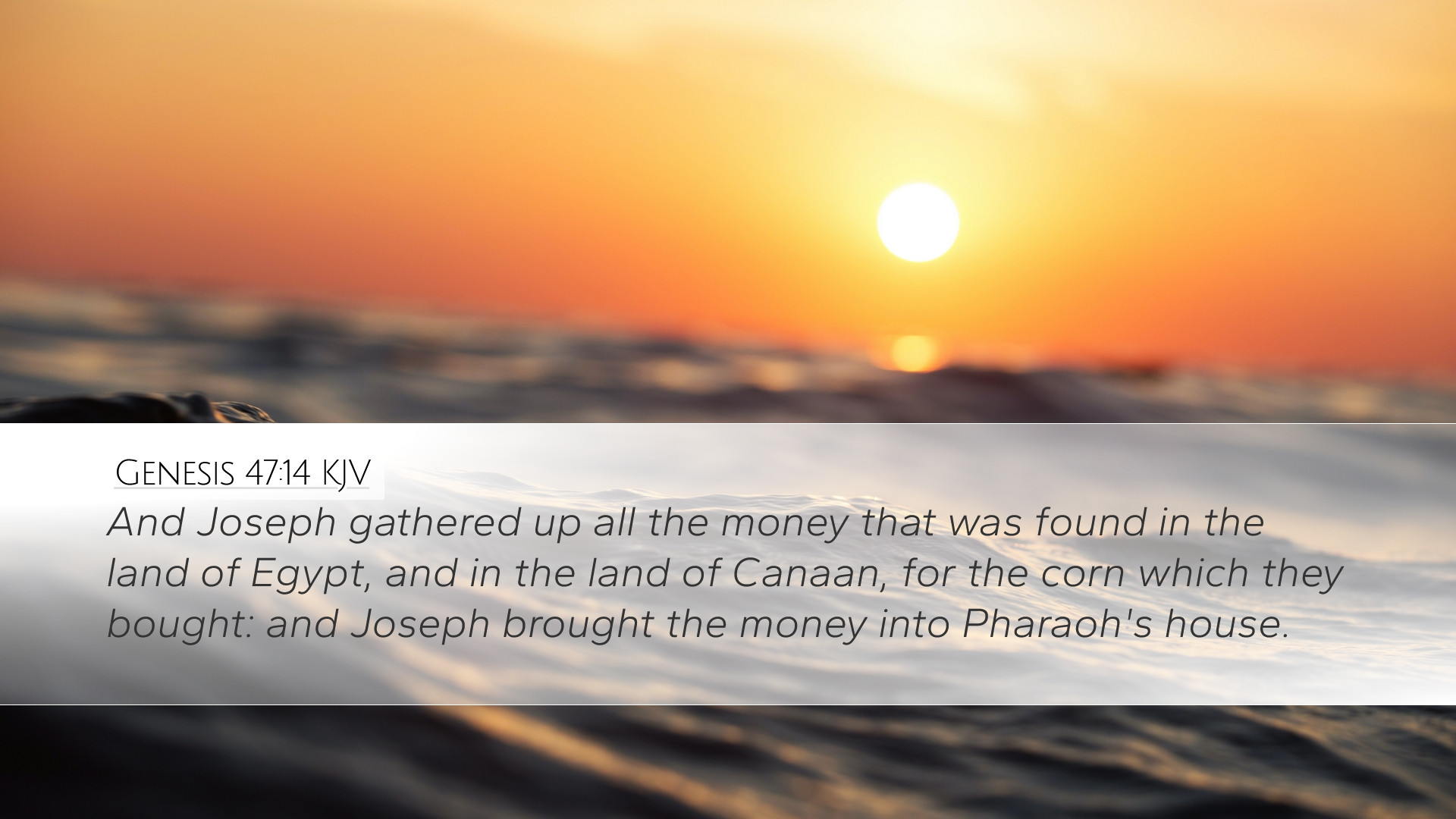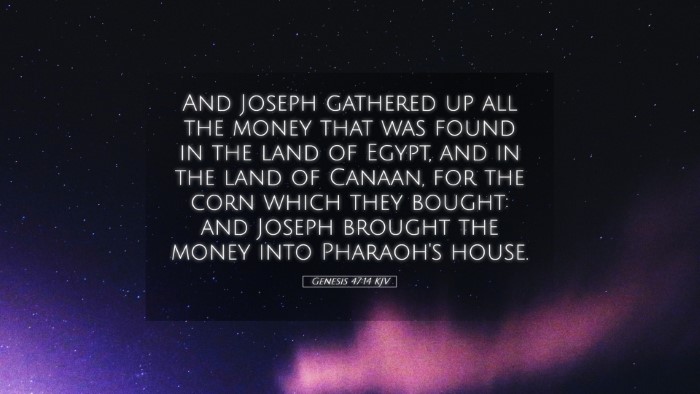Commentary on Genesis 47:14
Verse Context: Genesis 47:14 states, "And Joseph gathered up all the money that was found in the land of Egypt, and in the land of Canaan, for the corn which they bought: and Joseph brought the money into Pharaoh's house."
Introduction
Genesis 47:14 is situated within a pivotal narrative of the Genesis account, illustrating Joseph's administrative prowess during a severe famine that affected both Egypt and Canaan. This commentary seeks to provide layered insights into this verse, particularly emphasizing its theological implications and practical applications for ministry and scholarship.
Summary of Public Domain Commentaries
1. Matthew Henry
Matthew Henry notes that this verse reveals Joseph's role as a steward of Pharaoh's economic well-being. By gathering money from the people in exchange for grain, Joseph demonstrates both prudence and a keen understanding of economic principles. The act of collecting money represents the necessity of intense resource management during a crisis.
Henry emphasizes that Joseph's actions reflect the divine favor upon him. The governance he exhibits showcases not just administrative skill but also a commitment to serve the populace, which can be interpreted as a precursor to Christ's governance. Henry points out that during times of scarcity, wise stewardship becomes crucial, reminding us of the biblical principle of managing resources responsibly.
2. Albert Barnes
Albert Barnes highlights the significance of Joseph's gathering in a broader context. He observes how Joseph's collection of funds is a demonstration of the complexity of hunger and dependence during dire times. Barnes explains that the profound relationship between man and authority is seen here, as the people willingly relinquish their finances to secure food, illustrating a form of submission to the governing powers.
Barnes also discusses the implications of Joseph's action for the eventual fate of Egypt. By centralizing wealth under Pharaoh's control, it sets the stage for future governmental power and influence, imbuing the divine plan within human governance. The gathering of funds serves as a metaphor for reliance on God's provision; even in famine, God orchestrates the means of nourishment.
3. Adam Clarke
Adam Clarke provides an insightful commentary regarding the practical aspects of this transaction. He describes how such financial exchanges within the framework of a famine might affect social structures. Clarke points out that this transaction was not merely economic but also moral, with the preservation of life being the ultimate goal. Joseph's shrewdness is underscored, as he understands the desperation of the people and acts accordingly to maintain order and governance.
Clarke also draws attention to the fact that all nations depend on resources and that during shortages, the equity in distribution is vital. He suggests that Joseph’s actions could be seen as a foretelling of Christ's redemptive leadership in restoring humanity, highlighting the fact that both leaders understood the significance of their roles in providing sustenance.
Theological Implications
This verse encapsulates significant theological truths relevant to contemporary readers:
- Divine Providence: The ability of Joseph to manage scarce resources illustrates God's providence, affirming that God orchestrates events even in human hardship.
- Stewardship: Joseph serves as a model of stewardship, reminding believers of the importance of wise management and responsibility in leadership positions.
- Human Suffering and Government: The dynamics of suffering during famine highlight the necessity of just governance and care for the populace, calling modern leaders to reflect on their duties.
Practical Applications
For pastors, students, and theologians, Genesis 47:14 offers profound practical applications:
- Leadership and Responsibility: The example set by Joseph urges leaders in modern contexts to embrace their roles responsibly and ethically, especially in times of crisis.
- Resource Management: Churches and organizations can learn from Joseph’s model by implementing efficient resource management practices that reflect wise stewardship.
- Community Support: The need for community support and collaboration during difficult times is emphasized, encouraging communal action and the sharing of resources.
Conclusion
Genesis 47:14 encapsulates profound insights into leadership, stewardship, and the human condition during crises. By synthesizing commentary from notable theologians, we uncover the text's richness, demonstrating its relevance for faith leaders and scholars alike. Joseph's gathering of wealth in exchange for grain serves as a testament not only to his administrative acumen but also to a broader inclination towards God’s providence that transcends time and remains applicable today.


